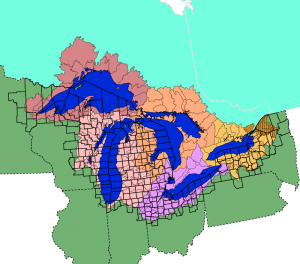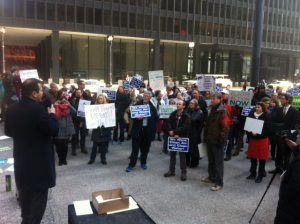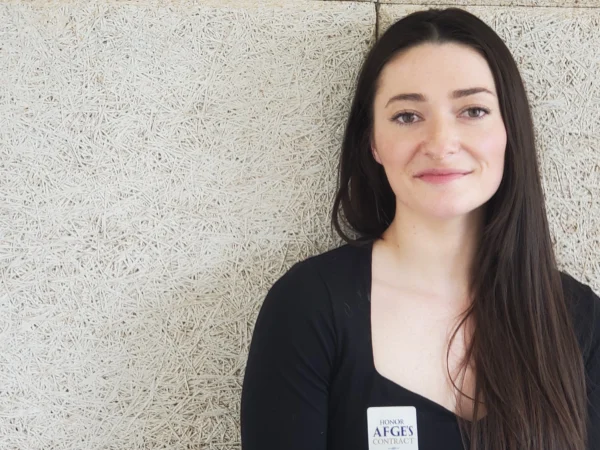
Can Cathy Stepp establish trust and sell a “Chamber of Commerce mentality” in Chicago?
Newly-appointed U.S. EPA Administrator for the Great Lakes region, Cathy Stepp, may be headed for a “we’re not in Kansas anymore” moment, to borrow a line from Dorothy in The Wizard of Oz.
Like Dorothy, Stepp is about to enter a realm in Chicago where the surroundings won’t be as comfortable as her familiar turf in Wisconsin.
She’ll assume responsibility for six states and the Great Lakes in her office at Jackson and Clark in the heart of the hustle of downtown Chicago.
The pace will be quicker, the issues more complex, the politics less accommodating, and natural allies may be hard to come by.
Absent will be support from Republican Governor Scott Walker who hired her to bring a “Chamber of Commerce” mentality to the Department of Natural Resources. Also missing will be Wisconsin’s Republican legislature who could assist in implementing Walker’s pro-business agenda.
Stepp will work in the spotlight that comes with being in Chicago, the de facto capitol of the region. The city has outsized Great Lakes clout, given that it only has 50 miles of Lake Michigan shore.
And Chicago is home to an environmentally activist mayor, Rahm Emanuel, a Democrat who recently hosted a climate change summit of world mayors who are defying the Trump administration on the climate issue.
And the Great Lakes are a priority for Emanuel.
As a member of Congress, he was an early advocate for the Great Lakes restoration program, often referring to the lakes as “our Grand Canyon.” It’s the same program that President Trump has tried to defund.
Need to “establish trust”
For perspective on what Stepp faces when she starts work on a bigger and more politically-charged stage, Great Lakes Now turned to John Dickert, who has made a similar transition.
Last year Dickert left his post as Mayor of Racine, Wisconsin to lead a Chicago-based coalition of U.S and Canadian mayors who lobby their respective federal governments on Great Lakes issues. He also knows Stepp going back to her days in Wisconsin as a real estate executive.
Dickert told Great Lakes Now that Stepp is “intelligent and loyal” and it will be important for her to grasp that she will have responsibility for one of the “most precious” resources in the world, the Great Lakes.
On a practical level, Dickert said Stepp needs to understand that environmental issues and the economy of the region are “intertwined” and unlike Wisconsin, they shouldn’t be “combative issues.”

Region 5 – Great Lakes Basin
Dickert said Stepp needs to approach issues in a manner that prevents outcomes like what has happened to Lake Erie where algae threaten drinking water and there is no agreement on how to remedy the problem.
Drawing on his own transition, Dickert said it will be important for Stepp to grasp the “importance of co-operation between the U.S. and Canada” on the lakes and the importance of the economic ties between the countries.
Dickert said Stepp will need to “establish trust with her Canadian counterparts” in an atmosphere where there is not a lot of trust at the highest level between the U.S. and Canada.
Practically, he wants Stepp to use the gravitas of her position to influence federal action on stopping Asian carp in the Chicago waterways system, an issue now in its second decade.

U.S. EPA staff in Chicago rally in early February to protest anticipated cuts at the agency. Photo courtesy Gary Wilson
Dickert says one of Stepp’s challenges will be to address the issues of the Great Lakes region but keep her actions in balance with direction from her boss, EPA Administrator Scott Pruitt who is re-defining the agency’s mission and reducing the workforce.
In Chicago, Stepp will have activist employees who have literally taken to the streets to protest President Trump’s proposed Great Lakes budget cuts.
Critics await
Stepp will have to deal with the sharp elbows of Chicago’s environmental groups who are unlikely to give her a honeymoon period.
Jack Darin, the Illinois Director of the Sierra Club, said in a statement on her appointment that Stepp has a “history of rolling back clean air and water protections in Wisconsin.”
Darin also drew a line in the sand on the Great Lakes saying his group will “stand with the women and men at the EPA who have dedicated their careers to protecting the Great Lakes.”
Influential Chicago-based environmental executives like Henry Henderson at the Natural Resources Defense Council and Howard Learner at the Environmental Law and Policy Center are unlikely to be silent on any attempt to rollback Great Lakes protections. Both groups are not afraid to take legal action, and Henderson is on record with expectations that she’ll deal with pollution issues on Chicago’s Southeast side and in Northwest Indiana.
As for the critics, Stepp’s former Wisconsin colleague Dickert says she “needs to set them aside to get things done.”
In an EPA press release, Wisconsin Gov. Scott Walker called Stepp a “trusted reformer” and Wisconsin Manufacturers and Commerce President Kurt Bauer said “I have no doubt that she will take a common-sense approach to environmental oversight, just as she did for nearly seven years in Wisconsin.”





